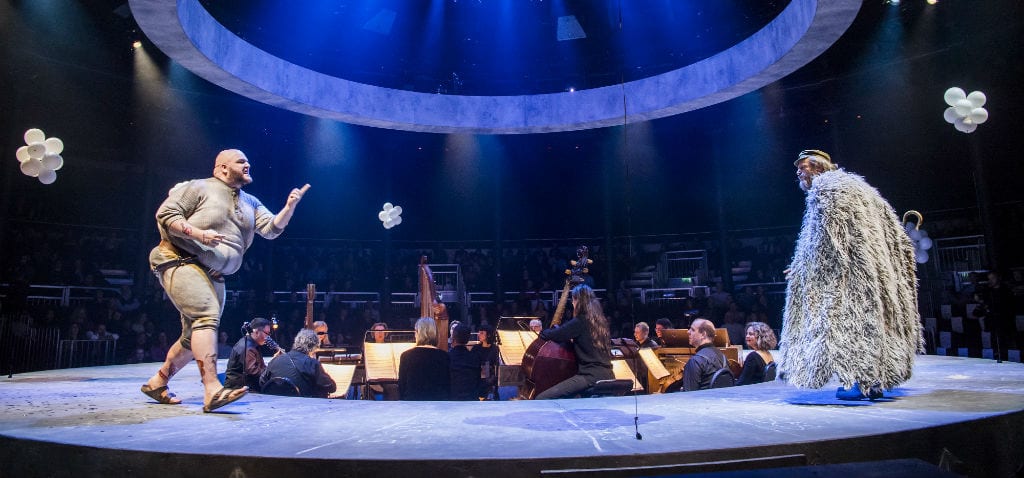This sublime opera was written by an aging Monteverdi for performance at the Venice Carnival in 1640. In this year, while the great mercantile republic of Venice was thriving and a number of public opera houses were already flourishing there, here in England Charles I, short of money to fight the Scots, was about to summon the short Parliament and was stumbling towards the confrontation with his subjects that ended in the establishment of a republic in England. It is remarkable that an opera from this remote time can seem so powerful today both in musical terms and, with an excellent modern director like John Fulljames at the helm, in dramatic terms too.
The story is familiar of course. It is drawn from the last section of Homer’s Odyssey and tells of Ulysses’ return to Ithaca after ten years of wandering. He disguises himself as a beggar and, with the help of his son Telemachus and the shepherd Eumaeus, he confronts and kills the suitors who have been pestering his faithful wife, Penelope. She, however, cannot believe that this old beggar is the long-lost Ulysses and only in the final moments of the opera realises that this man truly is the husband she has waited for all these years.
The Royal Opera has chosen to stage Ulysses at the Roundhouse and so the setting is a little disconcerting. In the centre of the performing space is a circular platform which revolves slowly and where the orchestra is seated. Around this central circle is an outer ring which also revolves and upon which most of the action takes place. The fact that both the circle and the ring revolve has both advantages and drawbacks – it means that no audience member gets back views of the singers all the time but it is surprisingly difficult to focus on the action, especially with a big chorus, drawn from community choirs in Camden and Thurrock, often packed into the cramped area between the outer ring and the front row of the audience.
The singers and the orchestral players are superb. As Ulysses, Roderick Williams is sensational. His voice is in turns rich and sensual and then harsh and tormented. His shocked reaction to the carnage of his revenge is moving and brilliantly sets the scene for the difficult final reconciliation with Penelope. On the night I saw the production this role was acted by an unwell Christine Rice and sung splendidly (from a seat in the middle of the orchestra) by Caitlin Hulcup. With such a big cast it is impossible to do justice to all the fine performances but big-voiced bass David Shipley is a superb Antinous, one of the suitors, and Catherine Carby is a physically and vocally impressive Minerva – and a skilful cyclist. The orchestra of the Early Opera Company is understandably entirely at home with the demands of Monteverdi’s complex music and, under the baton of the splendid Christian Curnyn, they produce a persuasive reading of a score which in less experienced hands can sound thin and distant.
Monteverdi’s operas do not always seem at home on the stages of large modern opera houses but the transfer to the Roundhouse’s theatre-in-the-round stage seems to me to raise as many problems as it solves. Even so, this is a production that is well worth seeing for its fine performances and its total commitment to the belief that early opera can enthral modern audiences when its stories are told with dramatic power and musical brilliance.

